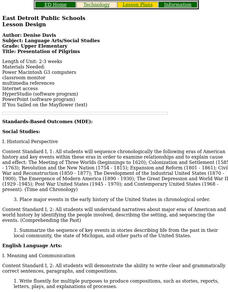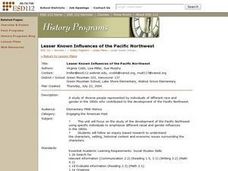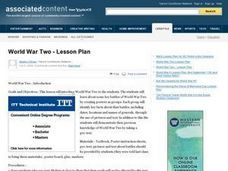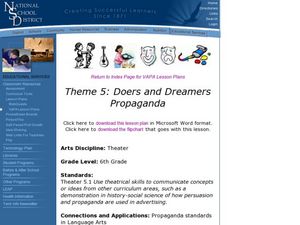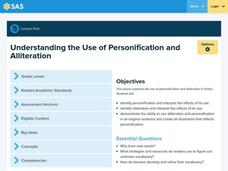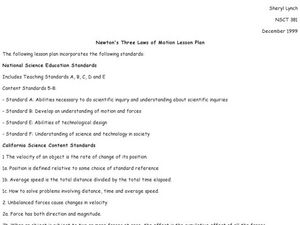Curated OER
Presentation of Pilgrims
Learners are given a category to research (clothes, life before the New World, the voyage, etc.) about Pilgrim life. s Students, in groups, create presentations using software program such as PowerPoint.
Curated OER
Comparing Time Periods in U.S. History: The Ashford Project
Fifth graders use a "fact book" comparing periods in American history then students create a picture to illustrate their assigned periods. # # students use their pictures and concept maps to write expository paragraphs about their...
Curated OER
Conversions That Make Cents
Eighth graders practice calculating problems using addition, subtraction, multiplication and division. They estimate solutions to algebraic problems. They also graph their solutions.
Curated OER
Streamflow
Learners discuss the topic of streamflow and how it occurs. They take measurements and analyze them. They interpret data and create their own charts and graphs.
Curated OER
Saving Hawaii
Students engage in a lesson about the a proposal for a sanctuary in the Northwestern Hawaiian Islands. They write a letter to the President of The United States in opposition to the proposal based upon classroom activities and research.
Curated OER
Art: Mirror Of History
Students show through art how major human events have changed American Culture. Students write in a journal to keep track of studying that is done during the unit. They also create an oral report.
Curated OER
We The People
Students engage in this introductory unit of history which is ideal for the first few weeks of instruction. The unit is meant to prepare students for the nation wide contest associated with History Day.
Curated OER
Lesser Known Influences of the Pacific Northwest
High schoolers engage in research about the development of the Pacific Northwest using specific individuals to emphasize different racial and gender influences in the 1800's. The research method that is used is inquiry based.
Curated OER
The Lewis and Clark Expedition
Middle schoolers discuss their prior knowledge of the Lewis and Clark expedition. Using the internet, they research the personal, political and economic influences that made an impact on the expedition. They also discover how the...
Curated OER
World War II
Students create a Powerpoint presentation covering key information regarding a World War II battle and present the information to the class in the form of an oral presentation. They then will turn in a summary report including two...
Curated OER
The Great Depression WebQuest
Tenth graders explore the events of the Great Depression. They analyze the events and select those most important to contemporary people and the future of the nation. Students create a PowerPoint presentation over the Great Depression.
Curated OER
Theme 5: Doers and Dreamers Propaganda
Seventh graders create and perform one act scenes that use the strategies of advertising. in this propaganda study lesson, 7th graders watch a commercial and are assigned a propaganda strategy. Students plan a scene that illustrates the...
Curated OER
Two Way Causality in Ecosystems
Young scholars complete various activities in order to explain that ecosystems are complex and that animal behavior (mainly that of a predator) is not necessarily intentional or bad.
Curated OER
Chewin' in the Chesapeake
High schoolers examine a web page on food webs and select a habitat to research. In this research lesson students identify the organisms found in the food web and present their findings to the class.
Curated OER
Investigating the Biosphere With Planetary Models
Students create a biosphere using the computer program SImEarth. They work in small groups to create "Daisyworld" in which they model aspects of the Gaia hypothesis. They form a question to answer and choose variables to investigate in...
Curated OER
Review of Personification and Alliteration
Young scholars study personification and alliteration in various fiction texts. In this literary devices lesson, students use various texts to identify the literary devices of personification and alliteration. Young scholars use examples...
Curated OER
Figurative Language
Twelfth graders examine personification and alliteration in various reading selections. They read magazine articles, brochures, and advertisements, identify the examples of personification and alliteration, and create a business name...
Curated OER
Newton's Three Laws of Motion Lesson Plan
Students explore Newton's three laws of motion using a variety of activities. In this physics lesson, students calculate the average speed of a vehicle they constructed using distance and time information. They identify and draw the...
Curated OER
Early America
Fifth graders, in groups, study the differences between the 13 Original Colonies, then explore the relationship between the Revolutionary War and the Civil War.
Curated OER
Local and Global Sustainability Unit
Students examine the characteristics that define a sustainable community at the local and global level. They create and prioritize a list of traits, read and discuss a magazine article, and create a poster.
Curated OER
Cougar or Human: Which Needs Protection?
Students research the biology and natural history of the cougar. Students conduct Internet research to determine how cougars have been protected by humans and how it is affected by human decisions. Students write about reconciling...
Curated OER
Tempo Contrasts in partner Dances
Students explore the differences in tempo through movement. In groups, students create an original dance phrase and illustrate both fast and slow movement. They share their observations and evaluate each dance according to originality...
Curated OER
Lead Detection
Students explore one method for the detection of lead in soil. The detection of the presence of lead in soil can be determined sensitively using inexpensive swabs. Pupils collect several spoonfuls of soil from various parts of their...
Curated OER
Mapping the Lost World of Urassi
Students create a mental map of Russia and its surrounding Republics. They create mental pictures through oral and/or written instructions. They experience a wide variety of new terminology in their quest to mentally map.


